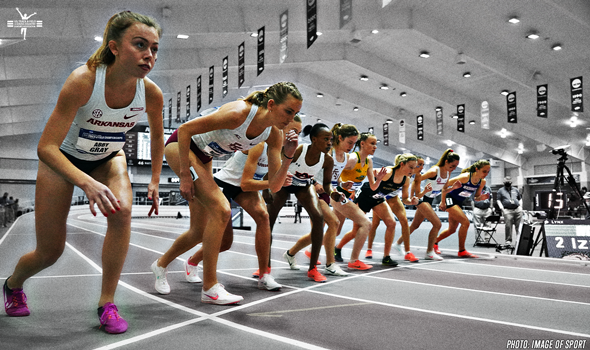
USTFCCCA News & Notes

Fast Times, Big Marks: This Is Now In Collegiate Track & Field
There has been A LOT of talk about collegiate milers recently.
We’re not going to stop that discussion, because it’s justifiable.
How about we sit back and admire the athletes’ accomplishments?
From The USTFCCCA InfoZone: Meets & Results | Records & Lists
Seventy-five different collegiate men have gone sub-4 in the mile this season.
Look at that number again: 75! It’s only February 18, too.
Just this past weekend, 34 of those men either broke the four-minute barrier for the first time in 2022 or improved their previous seasonal bests. Twelve of those men clocked their first sub-four miles, including Morgan Beadlescomb of Michigan State, who took over the collegiate lead in the event with his 3:52.03 effort at The Badgers Windy City Invite in Chicago. That moved him up to No. 4 on the all-time collegiate chart behind former Oregon standouts who beat him in that race (as well as another Duck great): Cooper Teare (No. 1, 3:50.39) and Cole Hocker (No.2, 3:50.55); and Edward Cheserek (No. 3, 3:52.01), who was not in the race at the Gately Indoor Complex.
Mario Garcia Romo of Ole Miss turned in an all-time effort at the Music City Challenge in Nashville, running the fastest mile ever recorded on an oversized track in collegiate history. He stopped the clock at 3:53.36, beating a talented field that saw each of the top-3 finishers go sub-3:55: Eliud Kipsang of Alabama was second in 3:54.36; Jonathan Davis of Illinois was third in 3:54.59. It was just the third time in collegiate history where three men went sub-3:55 in the same race (the 2021 Tyson Invitational and the 2013 Millrose Games were the others).
Of those 75 athletes who reached the zenith of the men’s mile this season, 70 are from NCAA Division I, three are from NCAA Division II, one is from both NCAA Division III and the NAIA. Both of those lone athletes from NCAA Division III and the NAIA are divisional record-holders: Aidan Ryan of Williams went 3:56.88 for the NCAA DIII standard; Zouhair Talbi of Oklahoma City turned in a 3:59.50 effort for the presumed NAIA best (We should mention that both of those men hold multiple divisional records, too: Ryan with the NCAA DIII 3000m best of 7:54.48; Talbi with the NAIA best in the 5000m of 13:18.17, which is No. 8 in collegiate history).
If you want an apt comparison on the women’s side, the updated World Athletics Scoring Table of Athletics gives a men’s sub-4 mile 1131 points, which equates to a sub-9 minute 3000m.
There are currently 12 women on the All-College Descending Order List that achieved that mark, led by Lauren Ryan of Florida State. Ryan went 8:47.88 at the Boston University David Hemery Valentine Invitational this past weekend to move up to No. 4 on the all-time collegiate chart. She and Mercy Chelangat of Alabama both notched all-time efforts in the same race (Chelangat was fourth in the race at 8:53.16 and found a spot at No. 12, just 0.56 seconds out of the top-10).
How does that compare to previous years on the end-of-regular-season Descending Order List? Seven women stopped the clock before nine minutes elapsed in 2021, nine did so in 2020 and 2019, while 10 hit that mark in 2018 (including Karissa Schweizer, who left room to spare and set the current collegiate record of 8:41.60). The most from 2010 to 2017 was four in 2015.
Many say, “It’s the spikes.” Other mention the fast tracks.
How about we sit back and admire the athletes’ accomplishments?
Go ahead and explain what we’ve seen in the hurdles, jumps or throws.
Before this season, only three women in collegiate history had gone 7.86 or faster in the 60-meter hurdles: 2013 The Bowerman winner Brianna Rollins (7.78), Virginia Powell (7.84) and Tonea Marshall (7.86). That number doubled in 2022, just in this past month alone: Alia Armstrong of LSU (7.81), Paula Salmon of North Carolina A&T (7.83) and Grace Stark of Florida (7.86). Both Armstrong and Stark have two marks of 7.86 or better this season.
Jasmine Moore of Florida took down the collegiate record in the women’s triple jump, a mark set four years ago by 2018 The Bowerman winner Keturah Orji. Moore bounded 14.55m (47-8), which topped Orji’s collegiate indoor best of 14.53m (47-8). Many thought Orji’s mark would sit No. 1 for longer than four years, but Moore made sure that wasn’t the case back on January 28.
And what about Shey Taiwo of Ole Miss in the women’s weight throw? Taiwo is doing things in that event which haven’t been seen since Brittany Riley in 2007 and 2008. Riley launched three career throws of more than 25.00m (82-0), including the collegiate record of 25.56m (83-10¼) in 2007. Taiwo hit 25.02m (82-1) at the Indiana Relays in late January and then one-upped herself two weeks later with a heave of 25.19m (82-7¾). Want to know where the second-best performer is on the seasonal Descending Order List? Try more than five feet shorter.
This season has truly been remarkable – and we still have one month to go.
